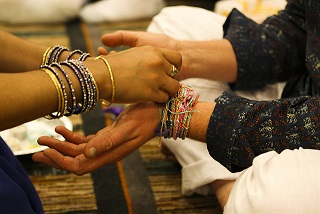Raksha Bandhan
Raksha Bandhan, also Rakshabandhan, or simply Rakhi, is an annual rite in South Asia, or among people of South Asian origin, centred around the tying of a thread, talisman, or amulet on the wrist as a form of ritual protection. The protection is offered principally by sisters to brothers, but also by priests to patrons, and sometimes by individuals to real or potential benefactors... (more)
Raksha Bandhan is the bondage of protection
” …Today in India, we celebrate a special festival. It is called as Raksha Bandhan. Rakshan means protection and Bandhan means the bondage, the bondage of protection. It’s a very nice, good, social custom to have this beautiful festival today. Today is the full moon day, and this day what we do is to tie a band of threads around the person whom you want to protect. It is done between brothers and sisters. The sisters tie this bondage to the wrist of the brothers, and when we do that, they’re putting all their love around the wrist, that it is the day for giving all their love, everything to their brother, as a protection, as a symbol of their protection th rough that thread. It’s a very, very simple thread they use. And this is has to be tied on the left- hand side. But people tie it on the right-hand side, which is a mistake, but it has to be tied on the left-hand side.
In our Sahaja Yoga the significance of left wrist is that it is the left Vishuddhi. Left Vishuddhi, which is here. And this is the left Vishuddhi expressed here, you know that very well. Now, left Vishuddhi is the place where our relationship of brothers and sisters exist. When they are disturbed within us, we start getting the problem of the left Vishuddhi. In these modern times, the talk of pure relationship seems to be quite boring for many people, but it’s very practical and logical. I would say it is the most scientific thing to do. For example, every brother has a special feeling for a sister, and her chastity is very dear to every brother, if he is a normal person. If he is abnormal, then forget it. But normally a brother is very particular about the chastity of the sister, and he doesn’t like anybody to – in any way – even pass a remark against the chastity of his sister. I mean these natural things we might have lost because of, whatever you may call it, the modern style of thinking or the machinery that is sitting on our heads, but the normal thing is to feel that way, purely, about the sister. And the sister about the brother. Brothers’ and sisters’ relations are extremely pure and are also accepted in this country very well … “
